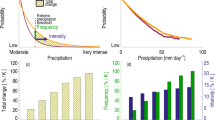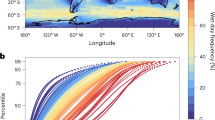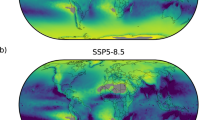Abstract
THE perennial interest in the chances of good weather in our short English summer is quickened by the advance of spring. While the weather map is the vade-mecum of the forecaster of to-morrow's rain, it cannot help us to arrange our holidays in advance. We can, however, derive a great deal of information from a study of the accumulated statistics of the past.
This is a preview of subscription content, access via your institution
Access options
Subscribe to this journal
Receive 51 print issues and online access
$199.00 per year
only $3.90 per issue
Buy this article
- Purchase on Springer Link
- Instant access to full article PDF
Prices may be subject to local taxes which are calculated during checkout
Similar content being viewed by others
References
The question is dealt with in two recent papers: œ The Distribution over the British Isles in Time and Space of the Average Number of Days with Rain. œ British Rainfall, 1926, pp. 260–279, and œ The Distribution over the British Isles of the Average Number of Days with Rain during each Month of the Year, Q.J.R. Meteor. Soc., 54; 1928.
Rights and permissions
About this article
Cite this article
GLASSPOOLE, J. The Frequency of Rain over the British Isles. Nature 121, 591–594 (1928). https://doi.org/10.1038/121591a0
Issue Date:
DOI: https://doi.org/10.1038/121591a0
Comments
By submitting a comment you agree to abide by our Terms and Community Guidelines. If you find something abusive or that does not comply with our terms or guidelines please flag it as inappropriate.



